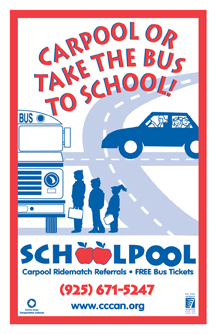Contra Costa County SchoolPool - CA
FAST FACTS ABOUT: Contra Costa SchoolPool
Types of TDM: Mode Choice
Keywords: school pool, rideshare, transit, students
Area Demographics: Contra Costa County, one of the
nine counties in the San Francisco – Oakland Bay Area.
Program: Rideshare matching service offered to parents
to encourage consolidating school trips. Additional incentives to ride
local transit are also provided.
Results: In 2002, 536 families joined a carpool and
27 % of carpools formed in 2001 continued carpooling in 2002. The program
has also been credited with an annual vehicle trip reduction of 1.1
million and a vehicle miles traveled (VMT) reduction of nearly 4 million.
Cost of Program: $95,000 for the 2002/2003 school year.
Staff: SchoolPool requires a full time employee for
6 months or a half-time employee on an annual basis.
Contact: Lynn Osborn, CCCAN Program Manager, www.cccan.org

Identifying the Problem – Outside of the Classroom
The SchoolPool program serves western, central, and eastern Contra Costa
County, in the northern California Bay Area. Very few schools in Contra
Costa County offer bus service for their students. As a result, traffic
congestion within the communities surrounding the schools presents a
significant mobility challenge. The average one-way trip length to or
from school within Contra Costa County is about 4.3 miles. Similar to
other parts of the country, crowded classrooms are forcing students
to attend a school “across town” instead of in their own
neighborhood.
Offering Options for School Trips
The SchoolPool program is administered by staff at the Contra Costa
Commute Alternative Network (CC CAN) and has been in operation for 5
years. The goal of the SchoolPool program is to provide parents with
information on neighboring students who are interested in carpooling
to and from school, and to encourage the parents to establish a carpool.
Carpooling is voluntary and no financial incentive is offered to the
parents. Carpool ridematch lists are provided to parents with students
attending the same school(s) to encourage carpooling. It is promoted
among residents who have children in all public and private schools
throughout the County (kindergarten through college).
For the 2002 school year (July 2002 – June 2003), carpool ridematch
forms were sent directly to 150 participating schools and in turn were
distributed in Fall registration packets to over 157,000 school children.
Additional program outreach efforts included presentations to Parent
Teacher Associations (PTAs) and school administration.
As ridematch applications are received, rideshare matches within the
same district are found and sent within three days to the applicant.
For the 2002 school year, approximately four ridematch lists were sent
to each parent during the course of the first three months of the school
year. Additional ridematch lists were sent throughout the year as new
parents moved into the school area, or as parents’ commute patterns
changed.
Parents who were unable to find a carpool partner were encouraged to
have their children try transit instead of driving. To encourage participation,
a $20 bus pass was provided for the student’s use. CC CAN Staff
worked with County bus operators to develop bus schedule brochures for
each school district. In turn the brochures were distributed with free
tickets so that parents could see and experience which routes and schedules
serviced their schools.
SchoolPool requires a full time employee for 6 months or a half-time
employee on an annual basis. The most intense time is between April
and October when registration forms are generated and distributed and
most of the outreach occurs. The total program cost for SchoolPool during
the 2002 school year (July 2002 to June 2003) was $95,000.
Setting a Good Example
For the 2002 school year, 710 individual ridematch requests were received
from parents. Of these, 174 included siblings (essentially duplicate
requests) who were also riding in the carpool, which resulted in a total
of 536 unique ridematch requests. In general, parents must make two
round trips to the school (one each morning, and one each afternoon)
to pick up their children. These two round trips equate to four one-way
trips. Allowing for 25% of the trips to be drop-offs on the way to work,
it is estimated that three one-way trips are saved for each non-sibling,
which in this case is a reduction of 1608 one-way trips per day.
A follow-up survey was conducted to determine the usage and satisfaction
of program participants from SchoolPool 2001/2002. Of the participants
who were contacted, 27% indicated that they have continued to carpool
resulting in continued reduction of 816 one-way trips per day.
In addition to the carpool riders, another 1,932 students received bus
passes in 2002. These passes were given to students whose parents indicated
that they usually drive the student to school. Nearly 2,000 bus riders
equates to a reduction of around 4,000 one-way trips per day.
Collectively, the three groups discussed above, new carpools, 2001 carpools
still ridesharing, and bus riders have contributed to an annual one-way
trip reduction of 1.13 million trips and a vehicle miles traveled (VMT)
reduction of 3.96 million.
In addition, due to additional school bus cutbacks in the summer of
2003, the SchoolPool Program had over 3,000 bus riding participants.
The construction of a new school without bus service (even public bus
service) has resulted in additional rideshare requests topping the 2002
totals.